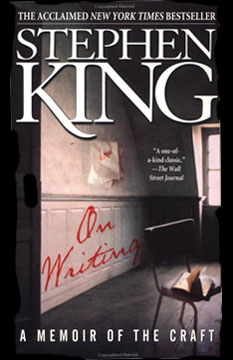 ON WRITING, A MEMOIR OF THE CRAFT by Stephen King (a book review by R. W. Ridley) The King has spoken, and all I can say is, “it’s about damn time.” Stephen King, the master of the macabre, the purveyor of poignant prose, author of more than thirty international bestsellers, is finally giving his fans and aspiring writers an inside glimpse at how he has perfected his craft over the course of his illustrious career. And in doing so, he provides all writers, professional and amateur alike, an invaluable tool to hone their own writing skills. King’s book, On Writing, a Memoir of the Craft, is divided into two parts. The first part is a memoir of the author’s life. I must admit, my first reaction to this part of the book was reserved at best. I was eager to jump into the mind of this mad genius. What makes him tick? Does he write with pad and pen or typewriter or word processor? What reference material does he use? I wanted to know the minutiae of his writing routine so I could shamelessly model it and develop the same formula for success. But as I read I realized that who King is and how he reveals himself in his writing is as crucial to his success as the actual methods he uses to write. What I learned was his life, although peppered with occasional bouts of hardship (The tale of his overweight babysitter sitting on his face and farting is particularly hard to get through without feeling young Stephen’s pain), was extraordinarily ordinary. Yet, King recalls his past with such warmth and affection, you cannot help but feel invested in his life and herein lies the true talent of Stephen King. While his subject matter sometimes sways into the realm of the supernatural, his writing style itself is brilliantly subtle. He can make the uncommon entirely familiar and the common utterly unique. It is this paradox that makes Stephen King one of the modern literary greats. In the second part of the book, King shares his philosophy and expertise on the craft of writing. It’s full of “rules” that are neither steadfast nor meaningless. They are guidelines that hover just above the status of suggestions from a proven professional. For example, King laments the overuse of adverbs especially those of the ‘-ly’ variety. He writes that these modifiers are the creation of timid writers - writers who don’t trust their own talent to convey a character’s intent or emotion without the use of adverbs that often times create an endless loop of redundancy. However, when you read this section you’ll notice that King himself commits this sin on several occasions. He “really” does. In spite of this contradiction, I found this section to be one of the most helpful. I now read and write with a different mind set. I am on an ever-virulent adverb search and destroy mission. King does not completely outlaw adverbs, but he does advise that they only be used in moderation. Learning this lesson alone was well worth the price of the book. There are countless other tips in the “On Writing” section of the book. For instance, King points out you can’t be a writer of any merit without being an avid reader. He himself reads 70 plus books a year. He also gets into the details of his writing ritual that I so eagerly (notice my unnecessary use of an adverb here) wanted to know and when you read this part you’ll soon realize why he is so prolific. Stephen King’s On Writing, a Memoir of the Craft is chock-full of invaluable tips for the aspiring writer. Whether you’re a fan of King or not, I highly recommend it. Happy writing and watch those adverbs.
© 2001 R. W. Ridley |